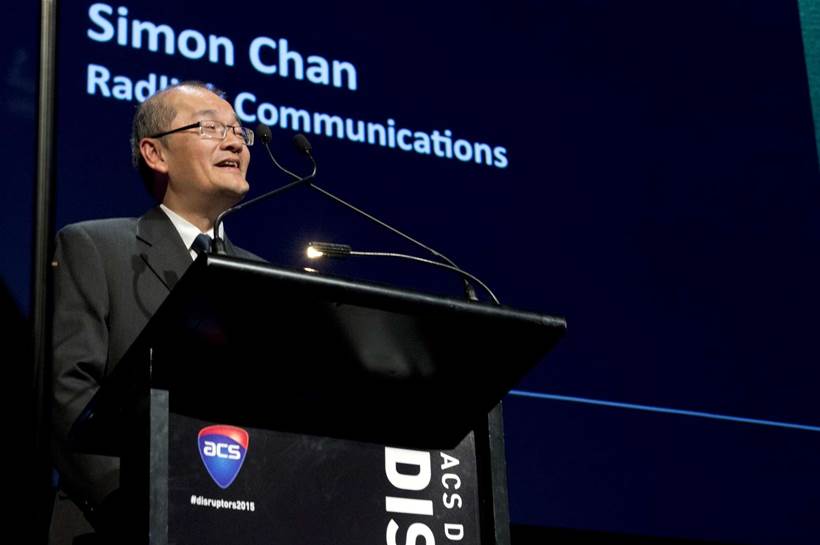Early on, Simon Chan knew engineering was his calling. It wasn’t until later in life the much heralded professional was paired with the perfect way to prove he belongs.
Chan, a resident of Perth, Western Australia, has earned quite the reputation for his research and development work as Chief Engineer at the growing radio hub of Radlink Communications. That shouldn’t be surprising, given his background.
What might be, however, is the method behind his validation and recognition.
While being honoured as the 2015 National ICT Professional of the Year at the Digital Disruptors Awards program presented by the Australian Computer Society, Chan was approached by a fellow ACS member to consider their certification program. A little over a month later, he officially earned his first industry certification to become an “ACS Certified Professional,” not by rote exam, but applied experience and expertise.
“The whole process was very interesting and painless,” said Chan, 51. “There was a need to collate up a whole lot of information in preparation, but it was all worth it.”
The son of a medical practitioner, Chan’s aversion to the sight of blood sealed off any consideration of following in his father’s footsteps. Instead, his love of “reverse-engineering” things led him into engineering with a slant toward electronics and software. While undertaking his final eight weeks of industry work experience as part of his engineering course, Chan worked alongside highly regarded technicians and engineers in the electronics and mechanical fields at Perth’s largest teaching hospital. These men and women were embarking on research and development in the application of technology to improve the wellbeing of patients. This inspired Chan to consider research as a possible future career path.
His first job upon graduation from the University of Western Australia was to work alongside Masters and PhD students who were embarking on innovative research for their thesis projects. Some of the students were working on early algorithms for speech synthesis as well as pattern recognition solutions for X-rays and sonograms. These early years of exposure to R&D set him on his path for the next few decades.
“I developed a huge appetite for cross-discipline reading and research,” said Chan. “I read anything and everything relating to software, hardware, electronics, signal processing, radio astronomy and healthcare.”
After learning additional programming languages to be able to market himself as a product design engineer, Chan had a hand in the design of a wide range of projects running from the CD-based jukebox to portable wireless EFTPOS terminals and speed control system for forklifts.
In his three years at the rapidly growing Radlink, Chan helped guide the company toward creation of cutting-edge technology within the two-way radio marketplace, which has earned the company multiple awards for ingenuity and creativity the past two years.
Chan himself has been recognized at level six (out of seven levels of responsibility) against the Skills Framework for the Information Age (SFIA). Level 6 means Chan has been validated to deal in highly complex and strategic work, as well as initiate and lead technical and business change, amongst other responsibilities.
SFIA is an integral part of ACS certification, a certification based on work experience, despite that experience taking place in smaller companies and along a somewhat non-traditional ICT path.
In contrast to the time-bound exams testing specific areas of knowledge within typical vendor certifications, ACS certification involves an assessment which charts degree claims of applicants on an international scale along with proven evidence of work experience and skill level. In short, they check to make sure applicants talk the talk and walk the walk. Anyone can remember information for an exam, but that doesn’t necessarily translate to workplace performance.
As Chan said, “once a person has commenced his or her working life, their experience gives the greatest clue about their technical interests and capabilities.
“It is also in their working life that they will be recognized by their peers for the contributions to their profession, and these will all be revealed during the certification process,” he said.
ACS certifications encompass an individual’s knowledge, skills and attributes, assessing qualifications right alongside work experience and communication skills. In essence, it levels the playing field for ICT professionals. On staff at a global conglomerate or earning wages at a regional mid-market firm, it doesn’t matter. The pertinent currencies are skill and experience.
2015 was a pretty significant year for Chan, having been recognized as WA Professional of the Year at the INCITE Awards in addition to the aforementioned ACS honor. The most lasting recognition, though, may be the certification he now holds based on that assessment.
“Many employers and clients look highly upon a Certified Professional as they have been recognized amongst their peers as having achieved a certain level of professional excellence,” Chan said. “For me, this process assures my peers, my potential employers and my clients that I have achieved that level of professional development and have been recognized for it.”
Simon Chan applied for CP – you should too.






.jpg.transform/320x180/img.jpg)


